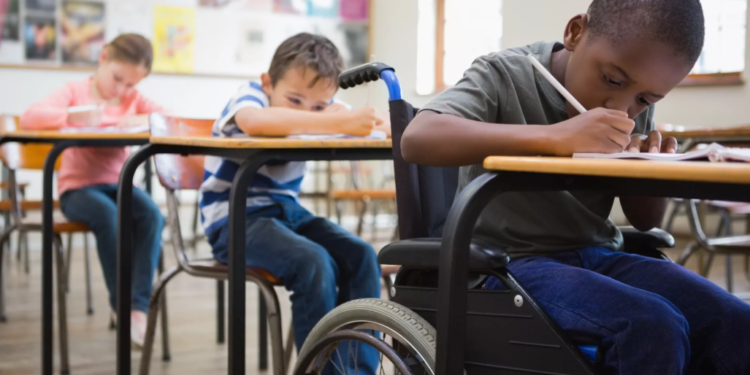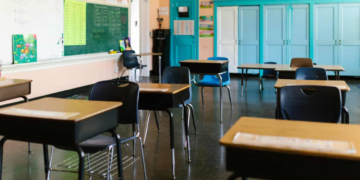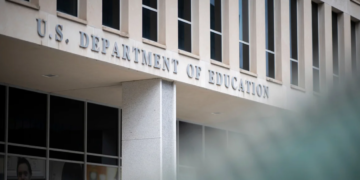April 10, 2025 Story by: Editor
A growing number of Tennessee school districts are coming under scrutiny for disproportionately disciplining Black students with disabilities, according to newly released data from the state. WSMV4 Investigator Courtney Allen has uncovered which school districts in Middle Tennessee have been flagged for significant disparities.
Parents across the region say this issue is all too familiar. “This is the 10th phone call I have got in the month about picking him up,” said Telisha Turner, whose son is on the autism spectrum.
For many Black parents raising children with special needs, the frequent calls to pick up their children from school due to behavioral issues are a growing concern. Turner shared that this was her experience at her son’s previous school. “I am a single parent,” Turner said. “I am working to provide for us. I can’t keep picking him up.”
State Data Reveals Sharp Increase in Disproportionate Discipline
According to 2023–2024 data, 21 school districts in Tennessee were flagged for “significant disproportionality,” a steep rise from just nine districts in the previous academic year. The majority of these districts were shown to be more than twice as likely to discipline Black students with disabilities compared to their peers.
“It is disturbing,” Turner said. “I am a little disgusted by it, because I fall into that category.”
Turner’s son now attends Metro Nashville Public Schools (MNPS), which has appeared on the state’s list for three consecutive years, beginning with the 2021–2022 school year. “We are not doing enough,” Turner said. “We have come a long way, but we still have a long way to go. I think that is where the Metro is.”
When asked for a response, MNPS referred WSMV4 to a prior statement issued in November, stating in part: MNPS “will continue to refine and expand our support systems to ensure every student is supported equitably and fairly.”
Parents Say More Support Is Needed
“They need to do better,” said Unique Brown. “They talk about no child left behind, that should include students that have special abilities.”
Brown’s son, who is also on the autism spectrum, will be starting kindergarten at MNPS next year. “I should not feel that he is going to be mistreated at school,” Brown added.
MNPS says it is training staff to reduce the high rate of disciplinary actions against Black students with disabilities. “We just have to make sure we keep fighting for them and make sure Metro is fighting with us and not against us,” Turner emphasized.
Other Districts Flagged for Disproportionate Discipline
The state report also identified four other Midstate districts with significant disproportionality in disciplinary actions:
- Clarksville-Montgomery County Schools
- Tullahoma City Schools
- Giles County Schools
- Sumner County Schools
Additionally, Franklin Special School District was flagged for disproportionately identifying Black students as having a significant learning disability.
District Responses to the State’s Findings
Franklin Special School District:
“The Franklin Special District (FSD) acknowledges the state’s determination of significant disproportionality in the identification of Black students as having a Specific Learning Disability (SLD) for the 2023-24 school year. According to the state report, our risk ratio for this category increased from 3.14 in 2021-22 to 3.71 and has remained at 3.71, exceeding the state’s threshold of 3.0.
In response to these findings, the FSD is taking the following steps in accordance with the Tennessee Department of Education’s (TDOE) requirements:
• Conducting a comprehensive review of policies, practices, and procedures to ensure full compliance with the Individuals with Disabilities Education Act (IDEA).
• Publicly reporting any required revisions to policies, practices, and procedures consistent with the Family Educational Rights and Privacy Act (FERPA) and IDEA regulations.
• Updating internal processes related to referrals, initial evaluations, and reevaluations.
The FSD remains committed to promoting equity and ensuring that all students receive the appropriate support to thrive academically and socially.”
Clarksville-Montgomery County School System (CMCSS):
“CMCSS continues to work with all stakeholders to ensure we have appropriate behavior plans and training to support all students. CMCSS has a team that meets monthly to review and discuss the data. As trends are identified, behavior consultants and BCBA’s provide additional support and training. Please see attached (pgs. 38-67) for a recent presentation from CMCSS’ Behavior Support Team about the comprehensive work in this area. A video is available here (beginning at 5:20). As indicated by the attachment you shared, several of the other larger, diverse districts in Tennessee are on this list. CMCSS leaders will continue collaborating with the state, other school systems, and experts to identify opportunities for improvement.”
Tullahoma City Schools (TCS):
“Although this information impacts less than one percent of the district’s overall enrollment, TCS takes this information incredibly seriously and strives to improve by evaluating practices. It’s important to note that this is a three-year designation, and the district is looking to move out of this designation. Last year, TCS implemented professional development for our staff members and provided social-emotional learning support for our students. TCS additionally held training for leadership members, in which the district desegregated data in a detailed manner to inform and assist in making changes. The district has seen positive changes this year, but there is room for improvement, and TCS administrators will continue to work to progress.”
Metro Nashville Public Schools (MNPS):
“At Metro Schools, we are committed to creating an inclusive and supportive environment for all students. We recognize the need to address the higher rates of suspensions and expulsions among students with disabilities, particularly among Black students. We view this as a critical issue that demands a thoughtful and comprehensive approach, and it is a district priority to address it.
Our efforts are rooted in a multi-tiered support system that prioritizes proactive behavior management and early intervention. This includes implementing positive behavioral supports through our Social Emotional Learning (SEL) and Restorative Practices, which are part of the Multi-Tiered System of Supports (MTSS) in our schools. By fostering emotional, social, and academic growth, we work to prevent behavioral challenges before they escalate.
To support this initiative, we recently launched a new support and intervention monitoring system, enabling us to better and more closely monitor behavioral data and provide personalized interventions based on individual student needs. This integrated system’s capabilities allow us to quickly identify students in need of additional support, thereby ensuring that intervention happens as early as possible.
Additionally, our district provides extensive training for school staff on managing challenging behaviors in a trauma-informed, culturally responsive manner. This professional development includes de-escalation techniques, restorative practices, and strategies for building strong, positive relationships with students.
For students needing intensive support, we offer alternatives to suspension and expulsion, including our RESET program, Peer Youth Courts, and behavior support classes for students and caregivers. These restorative approaches allow students to address and reflect on behaviors while remaining connected to their educational environment. Additionally, the district’s mentoring program connects students with mentors who can support students with their academic and social-emotional development. Our goal is to ensure that disciplinary actions serve as learning opportunities and promote positive, long-term outcomes.
We know there is more work to be done, and we are fully committed to creating a school culture that values the diversity of our students and helps them thrive. MNPS will continue to refine and expand our support systems to ensure every student is supported equitably and fairly because our mantra is every student known.”
Source: WSMV 4

















